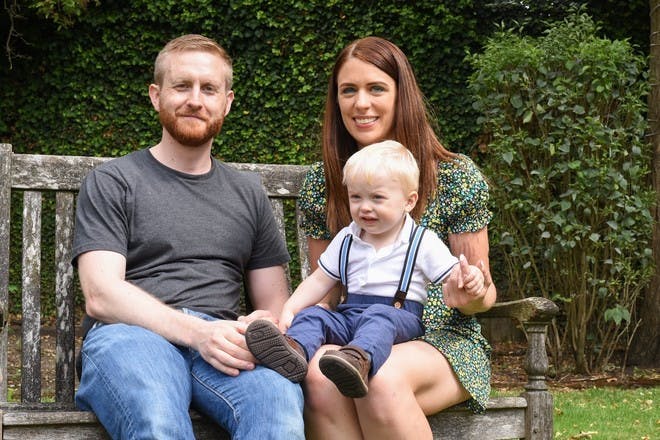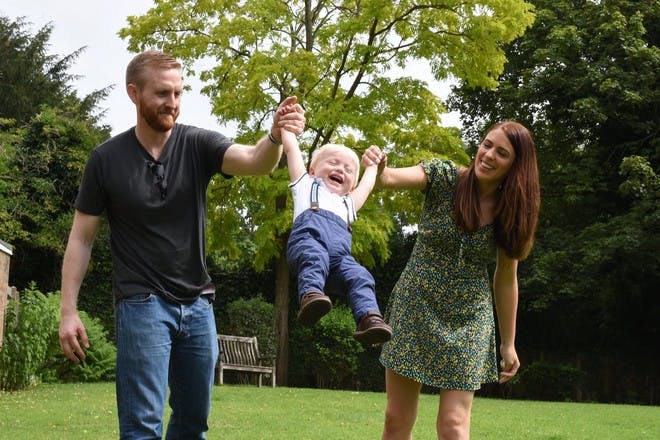Netmums Voices: 'What happens when you talk publicly about your maternal mental health'
Catherine Mousley’s PND story touched many women after she appeared on Louis Theroux’s ‘Mothers On The Edge’ documentary and began sharing her daily parenting challenges on Instagram. Here she writes about the positives and negatives of publicly sharing her story.
This page contains affiliate links, which means we may earn a small amount of money if a reader clicks through and makes a purchase. All our articles and reviews are written independently by the Netmums editorial team.
Looking back now, I was a prime candidate for Postnatal Depression (PND).
Given my history of an eating disorder, which spanned over 20 years, self-harm during my teenage years and a previous pregnancy that resulted in us having to make the decision to terminate at 17 weeks, I should have perhaps been more aware that I needed to take extra care of my mental health during my subsequent pregnancy.
This is what happened next.
My PND experience
I'd read about PND in an article years ago, among the words in the piece was a picture of a woman clutching her head in her hands, sobbing while her baby screamed beside her.
Having a visual representation to measure PND against meant I never noticed the subtle symptoms at first.
I cried a little more, slept a little less and skipped a few meals ...
As the days wore on, anxiety consumed me and simple tasks like leaving the house on time for an appointment, or preparing a meal, came with the unbearable weight of needing to execute it perfectly.
I'd been fed this fairytale by society: a smooth and uplifting birth, a mother who exclusively breastfed, glowing in her new role, and a baby that slept beautifully which gave her the time to present an impeccable appearance and household.
My reality turned out to be so wildly different.
Breastfeeding didn’t work out for us; Jake never slept longer than an hour in one go, which meant I barely got time to eat, let alone brush my hair and I grasped at my new identity with a vast sense of inadequacy.
Add to this the sleep deprivation, breastfeeding remorse, fluctuating hormones, isolation from moving to a new location, unresolved trauma from the previous loss and guilt – so much guilt – and I spiralled into a deep depression.
But I was also in denial.
I had a healthy baby boy to take care of, what did I really have to complain about?

Breaking point
One afternoon, I became that woman in the article. I cried heavily as Jake bawled next to me on the sofa and I realised I couldn't hide it anymore.
My partner called The Perinatal Team when I retreated to my bed under the weight of despondency and melancholy.
By this point, I was unable to hold or be in the same room as Jake.
The consultant I saw, concerned with my behaviour, suggested an admission to a Mother and Baby Unit.
I was lucky enough to secure a bed within the week and, although I didn't know it at the time, we were about to embark on an extraordinary journey.
Going public
One afternoon I got chatting to a woman who I'd seen on the ward a few times. She told me she worked for the BBC and that they wanted to make a new feature about PND and Post-partum psychosis (PPP).
She listened to my story and asked me if I would like to meet Louis Theroux for an informal chat.
I was a bundle of nerves; never in your wildest dreams do you think you are going to meet someone you watch avidly on TV when you’re going through an intensely traumatic situation.
I was filmed over four months for a documentary called Mothers On The Edge.
It was difficult at times but Louis had a gentle and very sensitive way of making me feel at ease, so I could openly converse and reveal the issues that led to me being admitted to hospital.
Initially I was wary about broadcasting our issues to the entire nation.
At the time we had only told a handful of family and close friends what was happening to us, so this felt like taking it to the extreme. Nonetheless, I knew this was an opportunity to help other women.
Along the way, I had met many mothers suffering in silence after experiencing the loss of a baby through a Termination For Medical Reasons (TFMR).
I recognised the level of guilt they felt at the choice they had to make and the feeling that they didn't deserve to grieve openly.
If I could share my story and speak honestly, would it support others in feeling less alone?

The positives and negatives
The positive reaction to the documentary was just what I hoped for. So many women and families came forward to tell me their stories of baby loss, PND and birth trauma.
Some thanked me because it has enabled them to admit that their feelings weren't ‘right’; others spoke about similar problems surrounding attachment and love.
It has cleared a way for a fresh dialogue surrounding motherhood and mental health – that it's not all glitter and sparkles, and that it doesn't make you any less of a mother to admit that you’re suffering and need help.
Of course, there are disadvantages to being so public with my struggles – I’ve opened myself up to judgement on many levels, which means that I have been on the receiving end of some vicious trolling.
It's hard not to take it personally when it's an attack on the difficult situations that I’m still coming to terms with myself.
The road to recovery isn't linear and I have suffered a couple of setbacks.
I do attribute the trolling, in particular being called a murderer due to my decision about my previous termination, to these regressions, combined with the unresolved trauma.
And yet I continue to speak openly though these difficult periods, receiving a tremendous amount of support in return, which has been beneficial and allowed me to recover faster.
There is something very humbling about finding solace with complete strangers.
My aspiration is that my recovery sends out a message of hope and strength, of an ongoing crusade that results in more self-awareness and empathy for others.
My willingness to be so public has also somehow encouraged deeper conversations with family and friends: a mutual, newfound respect and admiration for each other, a tighter hug here and there, and extra calls to check up and see how we are doing that has strengthened our bond.
These deeper conversations have highlighted that nearly every single one of us, or someone we know, has suffered at some point in our lives.
PND and PPP are serious illnesses yet women are still too afraid to speak up for fear of judgement about being labelled a bad mother.
Entering motherhood can be a time of extreme vulnerability and conflicting emotions so it’s important to reach out if everything feels like it is becoming too intense. Postponing asking for help makes it harder to treat.
I’ve found sharing your story can be a gift to everyone and using your own experience to become a source of support and comfort to others in distress can be a wonderful exercise for your own heart.
What I've learnt as a PND mum
There is no such thing as perfect mother! Embrace the good, as well as the bad and the ugly because, when you let go of perfection, you actually begin to appreciate the chaos and messiness of motherhood.
If I could tell another PND mum three things:
1. Just hold on long enough because, if you hold on, things shift and you become a new person.
2. Try and join one baby group. It can be reassuring to hear that other mums share your challenges and is a good social outlet.
3. This is not your fault. It can happen to anyone and you certainly aren't a bad parent.
The parent like me I look up to is ...
My friend Victoria. We met having faced similar circumstance and our bond has deepened as we’ve both gone on to have our rainbow babies. I commend her empathy, values and her style of parenting.
She’s always encouraged me, which has really helped me find my confidence as a new mum.
When I’ve confided in her about my struggles, she’s never judged me; something that I feel is invaluable in a friendship.
I feel especially grateful to have her in my life.
If you're struggling with PND and want someone to talk to, head to our Drop-In Clinic where our Parent Supporters are ready to help ...
Need advice?
Our health visitors and nursery nurses are on line Monday to Friday evenings to answer your queries on feeding, sleep and child health.
Follow Catherine on Instagram @maternalmentalhealthproject.
To talk to other mums who've experienced postnatal depression, connect with them in the Netmums Forum.
Related stories
CHAT – Have you had PND? Did you talk openly about your mental health
Netmums Voices – Jo Middlewon: Why I’m reclaiming ‘single parent’ as a badge of honour



